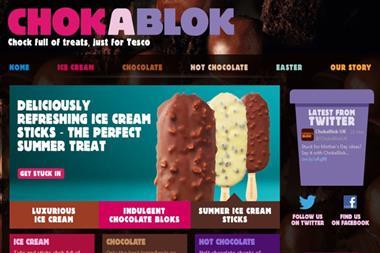Perhaps the new man thinks Tesco should make its money by putting products on shelves and selling them.” That was one supplier’s sarcastic take on Dave Lewis’s launch of an inquiry into the £250m profits overstatement last week, and his promise to “improve processes” and usher in a new era of transparency.
He will have his work cut out.
As the Financial Conduct Authority launched an investigation into the scandal (while the Groceries Code Adjudicator asked this week to be kept informed by external auditors Deloitte of any breaches of GSCOP rules), industry insiders will know retailers have for years been using a variety of tricks of the trade to legally extract money from suppliers.
As one wholesale source says: “Listing fees. Rebates. Trigger payments. It’s not just Tesco. We all do it.”
Nor are the sums small. When Morrisons bought Safeway, it found the value of the kickbacks and overriders was twice the value of the annual profits.
So, is new CEO Dave Lewis “kitchen sinking” the business “so he can look like a hero” as more than one analyst has suggested (while potentially saving a few million on redundancies)? At what point does the rough and tumble of sales negotiation become illegal?
While there does appear to have been an escalation in the sums demanded by Tesco, as we reported last week, “there are so many grey areas it’s very hard to pinpoint a single problem,” says Aidan Bocci, CEO of consultants Commercial Advantage.”
Lisa Jack, a former auditor and now forensic accounting expert at the University of Portsmouth, agrees “it’s easy to see how errors could be introduced into such a system if you are dealing with 1,000s of SKUs and scores of suppliers.
“Crucially, a rebate system relies on the retailer receiving accurate internal information from people - eg buyers - who may be incentivised through bonus systems to be overly optimistic in what they are promising to deliver.”
As one supplier puts it: “The danger is you get a culture where buyers do whatever is necessary to hit their bonus.”
However, “while everyone is trying to hit targets in a declining market,” Bocci has also observed a marked shift in the way retailers approach margins.
Retailers have shifted the focus from back margin (all key discounts/allowances, trade funding, listing fees etc), he explains, into front margin (the difference between the invoice price and the final retail price consisting of unconditional volume discounts and the retailer’s margin).
“This helps the big 4 achieve the same level of profitability but makes it less conditional and therefore less of a risk in terms of breaching GSCOP or their own declining volumes,” adds Bocci.
Mind the gap
David Sables, CEO of Sentinel Management Consultants, has detected not only a huge increase in the frequency and sheer scale of the demands, but also in terms of their ‘creativity’.
“You have to give them credit for some of the ruses they have come up with. It’s not one specific tactic. It’s a whole variety.”
One request he’s heard mentioned involves commodity-linked lines, such as wheat.
“The supplier is asked to provide lump sum discounts a year in advance of a forecast future commodity price decline.”
Another is requesting promotional trigger payments before a product is even on promotion, or annual bonuses before the target on which the payment is based has even been reached.
The sheer breadth of techniques (see glossary) provides the backdrop against which retailers try to plug their rolling gap, adds Sables.
“It’s fairly common for buyers to squirrel away back payments, for example, once they’ve hit their targets. “But to allocate those funds to a different tax period is illegal. The sum has to be accrued to the correct period.”
“A just gimme is quite a common feature among the supermarkets, particularly at the year end. But more and more stuff is being brought further and further forward. It’s a ticking timebomb because the decline in their business means the profit hole now can’t be filled from next period’s bumper performance. It’s not going to happen.”
How retailers extract money from suppliers: an A-Z by David Sables
Activation fund: Money paid into a generic category account to cover the cost of sales-driving initiatives in store, ie sampling, PoS or floor stickers. This may be split down into its constituent parts, such as a listing fee. Some retailers might cherry pick.
Advertising allowance: Fees paid to cover the cost of supplier ads carried on retailer media (posters, mags or online). Annual bonus: A fee paid to the retailer based on annual invoiced turnover - usually conditionally based on hitting targets and often linked to ‘growth’ and described as a percentage of total business at retail value. Aka an overrider. Retailers often demand it even when they have under-achieved on the targets. What’s also happened recently is that they’ve started to collect payment on a quarterly basis during the year. Inevitably they will get to the end of the year and insist on the payment.
Buying-forward payments: Retailers pre-order stock or take in stock earlier (or later) than they would otherwise. Often occurs either side of a supplier financial year end or before a supplier cost increase. The retailer can then sell the goods at the higher price.
Backhauling: Making use of retailer trucks that are passing supplier warehouses on the way back from making a store delivery to transport supplier deliveries to the retailer’s distribution centre. Initially this arrangement saves money for the supplier but it can have a knock-on impact on the overall cost efficiency of the supplier’s distribution fleet, as volume is reduced. The supplier can be asked to pay for something they could do cheaper. There have been instances where the supplier has been forced to use these.
Barcode change: A simple administrative task but retailers often charge an extortionate fee if the unique barcode on a pack or stock unit is changed - even if a supplier is doing it to help the retailer, an extortionate charge may be levied.
Category average margin: A KPI used by buyers to measure the profit generated by a product or supplier as a percentage of sales revenue against an average. Also known as a supplier category average margin or SCAM. A made-up number to give out to suppliers, described as an aspirational percentage to get a supplier to increase their percentage margin for the retailer.
Category captaincy: In theory an honour awarded to the supplier who offers the greatest levels of insight - but retailers have been known to opt for the supplier who is willing to stump up the most cash.
Currency correction: A change to the invoice price to reflect foreign exchange rates that should make the cost of goods (COGs) cheaper. Note: any currency fluctuations that work adversely to the retailer will be rejected and dismissed as the supplier’s problem.
Commodity prediction: Using forecast commodity costs to set pricing for an upcoming year. Aka pre-emptive terms.
Conference support fees: Money paid in return for the supplier sponsoring an element of a retailer’s conference, ie water, soft drinks, lunch, tea, coffee etc in return for a short mention.
Cost of Doing Business Allowance (CODBA): A completely made-up number to explain to suppliers how they need to appreciate the cost of doing business for the retailer, building new stores, refitting old fixtures, implementing new technology.
Coupon funding: Charges made to suppliers to pay for coupons given out to shoppers. The cost to suppliers doesn’t always reflect the true value of the coupons redeemed.
Charity funding: Requests for cash, product and resources to support a retailer’s charitable causes. The supplier will rarely get a mention when the charity money is handed over, the glory goes to the retailer for their ‘hard’ work in raising this donation. Astonishingly, this is targeted internally and buyers compete on it.
Date discount: A discount requested to cover the cost of taking in product that is closer to its best before/use by date Data costs: charges for access to loyalty card data supplied by the retailer - stock on hand, sales out, promotional forecast, category data. These payments can reach six figures. Suppliers are then expected to use it to come back and propose more money-making ideas to the retailer, and yet they are charged for it.
Equalisation fee: often used when supplier A acquires supplier B and the retailer wants all cost prices ‘equalised’ to the lowest common figure. Can also occur when retailer A acquires retailer B and then gets sight of a competitor’s cost prices. Aka terms harmonisation
Extended contract deal: A deal to extend the period of a contract in return for a better price up front. The retailer was going to extend the contract anyway.
Early payment terms: A percentage of invoiced turnover taken by the retailer in return for paying their invoices on time - or at least paying most of the money… and not too late.
Equipment allowance: Fees charged to suppliers when they put their own kit in store - fridges, freezers, display units.
Foreign price: ‘Give me the price your business charges in Poland’ or wherever it’s cheapest on today’s exchange rate. Factory gate price: An attempt by the retailer to find out what is the actual cost of production by a supplier so they can commoditise the price and take more of the profit.
Feed price model: Used within agriculture to take the price back another stage to the farm in an attempt to guarantee prices based on the input price of livestock feed prices.
Facing payment: A fee charged for increasing the number of facings of product on shelf.
Gate monies: Broad term for a fee charged to ‘get in the game’ across a number of areas.
Growth payments: Payments demanded by a retailer on their way up. When they decline there is no acceptance of the fact that support payments should be going down. In fact they want more.
Hotspot location: A high-traffic or high-visibility display area in store. Charges are made for featuring the supplier’s product in a more prominent position.
Insights: Knowledge or trends about the market, category, shoppers or consumers. Retailers will expect this data for free. However, they will charge suppliers for exchanging any insights of their own.
Invoice deductions: A deduction made by retailers from monies that they owe suppliers - normally without authorisation and often without reason. In extreme cases this can be for late deliveries, reduced availability, damages or customer complaints. It can be very difficult for the supplier to recover this money.
Internet auctions: A bidding forum used to drive down the price on key hotspot locations or opportunities. Effective in commodity categories. Beware of retailer product specification changes after the auction. Has been regularly used in non-commodity categories to devalue a supplier’s added value.
Just gimme: A unilateral demand by a buyer for funding for no particular reason. Normally to fill a profit gap elsewhere.
Kill your competition fund: An offer by a buyer to take out your competition (or at least cut them back for a little while) in return for a ‘very reasonable’ incremental investment package. ie ‘pay me this and I won’t list their new product’.
Late delivery penalties: Charges made by retailers when your truck arrives late at the retailer’s DC. Note: late order penalties do not apply if they call you with a late request!
Loyalty bonus: a fee demanded by a retailer in return for placing a higher percentage of their business with you. For a while anyway.
Listing fees: Always requested but never refunded if they later delist the product after just eight weeks on sale!
Merchandiser payment: Charges to a third-party merchandising team (normally with a cut going to the retailer) for them to go in-store and make sure your products are displayed correctly. Paying money for one of the supplier-funded teams to do the work the store staff used to do.
Night investment: Charges levied by the retailer to cover the additional cost of ‘out-of-hours’ labour that do night shifts in store.
New store opening fee: A fee charged to suppliers each time a retailer opens, extends or refurbishes a store.
Open book terms: A request from the buyer for suppliers to share the full breakdown of components and costs associated with their product so that they can work out how much profit you make and what to ask for in the next negotiation. (You show me yours and I’ll show you what I want.)
Overrider: (ORD) A payment or rebate paid to a retailer - can be conditionally growth based or just a flat charge. See annual bonus.
Payment discount: A discount demanded in return for payment of invoices to the agreed schedule.
Platinum status preferred partner supplier fees: Like a very expensive frequent flyer scheme but with no preferred seating area in their reception.
Printing fee: A charge to suppliers made to cover the cost of printing all the point of sale materials. Note: this is often run as a profit centre itself!
Query resolution: The terms under which a retailer agrees to settle any disputed claims or deductions they have made. This can normally be expected to happen just after their financial year end and involve repayment of any due monies in approximately 120 days.
Retrospective demand: The back dating of any charges or fees by a retailer. Often uncovered by third-party auditors. GCA has just stipulated a two-year maximum for retrospective invoices.
Rebate: A payment paid to a retailer in return for compliance to agreed terms. By definition this is retrospective, but these days retailers are asking for it up front.
Seasonal events: A series of well-known (and lesser-known) public events that retailers use to create excitement with shoppers and from which they leverage premium display fees from suppliers. Used to be Christmas and Easter. Now Chinese New Year, Burns’ Night, Valentine’s Day, St Patrick’s Day, Mothers’ Day, Easter, Fathers’ Day, end-of-term teacher presents, back to school, Halloween, Bonfire Night - and Christmas. Unusually not St George’s Day!
Study tour participation fee: Suppliers pay to take buying teams overseas to learn about a new market.
System implementation charge: A charge made on suppliers for any system upgrades or changes in the retailer processing network.
Trigger funding: Used in calculating promotional funding by suppliers - the amount paid by the supplier for every product that is bought on promotion.
TV tags: Whereby a supplier and retailer agree the other party can be featured at the end of a TV ad - “available at Tescmart” - or charged when a product is featured in a retailer advert.
Tenders: A procurement process used by buying teams to solicit interest and offers for a specified product supply - a very tactical way to drive down price.
Ullage: A percentage of invoiced turnover charged by a retailer to cover damaged and stock loss (theft) after they take ownership of stock. If you damage it you pay, if they damage it… you pay.
Vendor Managed Inventory (VMI): Supplier teams take on the responsibility (and cost) of managing the stock levels in a retailer.
Voucher: A coupon or docket given to shoppers to encourage them to return and buy again.
Wobbler: A piece of point of sale material that stands out from the fixture to attract the attention of shoppers.
Xtra fill compensation: A charge made for the profit a retailer would have made on the ‘extra free’ product that suppliers give away as a promotional offer to shoppers.
Y not!: Justification of a just gimme
Zone fee: The cost of getting a siting in a primary shopper flow area.
David Sables is the CEO of Sentinel Management Consultants, the sales negotiation experts.



















No comments yet